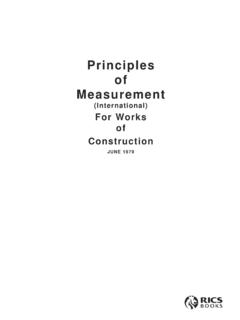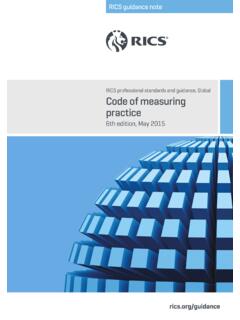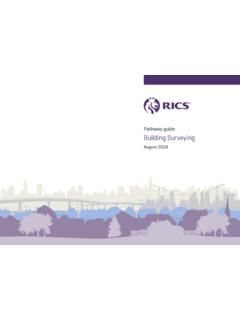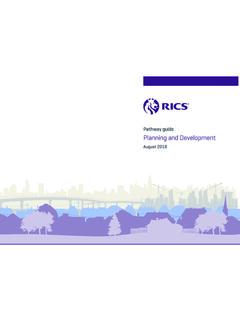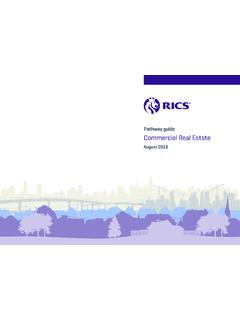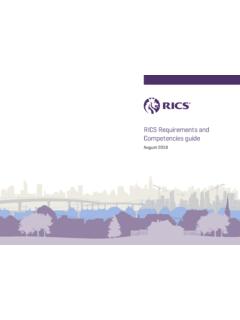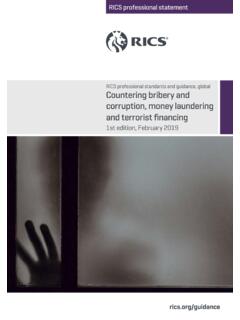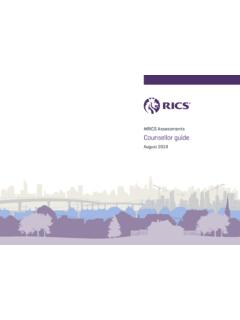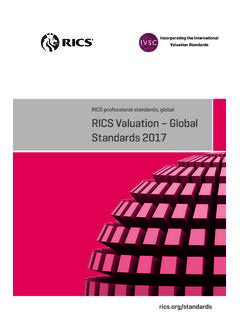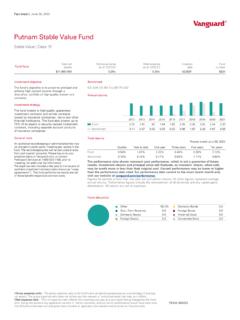Transcription of RICS professional standards and guidance, UK Value …
1 RICS guidance note RICS professional standards and guidance, UK. Value management and Value engineering 1st edition, January 2017. Value management and Value engineering RICS guidance note, UK. 1st edition, January 2017. Published by the Royal Institution of Chartered Surveyors (RICS). Parliament Square London SW1P 3AD. UK. No responsibility for loss or damage caused to any person acting or refraining from action as a result of the material included in this publication can be accepted by the authors or RICS. Produced by the Black Book working group of the Royal Institution of Chartered Surveyors.
2 ISBN 978 1 7832 182 1. Royal Institution of Chartered Surveyors (RICS) January 2017. Copyright in all or part of this publication rests with RICS. Save where and to the extent expressly permitted within this document, no part of this work may be reproduced or used in any form or by any means including graphic, electronic, or mechanical, including photocopying, recording, taping or web distribution, without the written permission of RICS or in line with the rules of an existing licence. Typeset using Typefi. Value management and Value engineering Acknowledgments Lead author David Churcher (Hitherwood Consulting).
3 Working group Chair: Andrew D. Smith FRICS (Andrew D. Smith Ltd). David Benge FRICS (Gleeds Corporate Services Ltd). John Davidson FRICS (BT Internet). Stuart Earl FRICS (Gleeds Cost Management). Roland Finch FRICS (NBS). Christopher Green FRICS (J Murphy & Sons Limited). Roy Morledge FRICS (Nottingham Trent University). Michelle Murray MRICS (RPS Group Plc). Michael T. O'Connor FRICS (Carillion Construction Ltd). Steven Thompson (RICS). ii RICS guidance note, UK Effective from 1 May 2017. Contents Acknowledgments ii RICS professional standards and guidance 1.
4 Introduction 3. earned Value management 3. General principles (Level 1: Knowing) 4. Definitions and introduction to the concepts 4. The benefits of VM and VE to clients and delivery teams 5. A comparison of the features of VM and VE studies 6. Relationship to other project management activities 6. Practical application (Level 2: Doing) 8. How and when to carry out VM and VE 8. Determining the Value criteria for a project 9. Identifying what does and what does not add Value 10. Prioritising and weighting alternative technical solutions 11.
5 What resources are needed to carry out VM and VE? 12. Reporting the outcomes of the study 14. Practical considerations (Level 3: Doing/advising) 15. Potential problems when carrying out VM and VE studies 15. Appropriate facilitation skills and VM workshop techniques 16. Designing large-scale VM programmes 17. Appendix A: Bibliography 18. Effective from 1 May 2017 RICS guidance note, UK iii RICS professional standards and guidance International standards will be asked to explain the actions they did take and this may be taken into account by the Panel.
6 RICS is at the forefront of developing international standards . In addition to RICS Valuation professional In some cases there may be existing national standards standards , other international standards are being that may take precedence over this guidance note. developed. Working in coalitions with organisations around National standards can be defined as professional the world, acting in the public interest to raise standards standards that are either prescribed in law or federal/local and increase transparency within markets, International legislation, or developed in collaboration with other relevant Property Measurement standards (IPMS ), bodies.
7 International Construction Measurement standards In addition, guidance notes are relevant to professional (ICMS), International Land Measurement standards competence in that each member should be up to date (ILMS), International Ethics standards (IES) and others will and should have knowledge of guidance notes within a be published and will be mandatory for RICS members. reasonable time of their coming into effect. Most RICS professional statements link directly to these standards and underpin them. Where that is the case, This guidance note is believed to reflect case law and RICS members are advised to make themselves aware of legislation applicable at its date of publication.
8 It is the the relevant international standard(s) (see ) member's responsibility to establish if any changes in case and the overarching principles with which the associated law or legislation after the publication date have an impact professional statement complies. Members of RICS are on the guidance or information in this document. uniquely placed in the market by being trained, qualified and regulated by working to international standards and complying with professional statements. RICS guidance notes This is a guidance note.
9 Where recommendations are made for specific professional tasks, these are intended to represent best practice', recommendations that in the opinion of RICS meet a high standard of professional competence. Although members are not required to follow the recommendations contained in the guidance note, they should take into account the following points. When an allegation of professional negligence is made against a surveyor, a court or tribunal may take account of the contents of any relevant guidance notes published by RICS in deciding whether or not the member acted with reasonable competence.
10 In the opinion of RICS, a member conforming to the practices recommended in this guidance note should have at least a partial defence to an allegation of negligence if they have followed those practices. However, members have the responsibility of deciding when it is inappropriate to follow the guidance. It is for each member to decide on the appropriate procedure to follow in any professional task. However, where members do not comply with the practice recommended in this guidance note, they should do so only for good reason.
